
 Giovanni Maria DettoriDOVER PUBLICATIONS, INC.Mineola, New YorkCopyright Copyright 2011 by Giovanni Maria Dettori All rights reserved. Bibliographical Note2,001 Most Useful Italian Words is a new work, first published by Dover Publications, Inc., in 2011. Library of Congress Cataloging-in-Publication Data Dettori, Giovanni Maria. 2,001 most useful Italian words / Giovanni Maria Dettori. p. (Dover language guides) English and Italian. eISBN-13: 978-0-486-17394-8 1. eISBN-13: 978-0-486-17394-8 1.
Giovanni Maria DettoriDOVER PUBLICATIONS, INC.Mineola, New YorkCopyright Copyright 2011 by Giovanni Maria Dettori All rights reserved. Bibliographical Note2,001 Most Useful Italian Words is a new work, first published by Dover Publications, Inc., in 2011. Library of Congress Cataloging-in-Publication Data Dettori, Giovanni Maria. 2,001 most useful Italian words / Giovanni Maria Dettori. p. (Dover language guides) English and Italian. eISBN-13: 978-0-486-17394-8 1. eISBN-13: 978-0-486-17394-8 1.
Italian languageGlossaries, vocabularies, etc. 2. Italian languageTerms and phrases. 3. Italian languageTextbooks for foreign speakersEnglish. Title. Title.
PC1689.D48 2011 458.2'421dc23 2011020253 Manufactured in the United States by Courier Corporation 47625101 www.doverpublications.com ContentsIntroduction This phrase book is aimed at people who have no knowledge, or only a basic knowledge of Italian. However, it can also be beneficial to readers who have a greater familiarity with the language. In fact, the 2,001 words selected primarily touch upon terms used in daily conversations and situations: introducing yourself and other people, asking for directions, ordering food, discussing health problems, your preferences, buying clothes, talking about daily activities and hobbies. However, many terms are taken from more complex situations and deal with more difficult contexts such as politics, economics and abstract words. This phrase book can be used by people who are planning to travel to Italy and want to get by with their existing Italian, and want to communicate with native speakers of the language. Furthermore, it can also be very useful for those learning Italian.
This book is a rich source of terms and can be used to expand your Italian vocabulary and can also function as a handy basic dictionary. Its format makes it easy to carry it around and review and expand your Italian vocabulary. Every word is followed by an English translation, and a sentence in Italian where the word is used in context. The Italian of the phrase book covers different registers of the standard language, from the more formal to the colloquial. The sentences presented are fundamental in giving a better understanding of the words listed and provide a context that is essential in determining the meaning of words. As everybody knows, a word can have several meanings and if it is not used in context, we cannot accurately determine what it means.
For example, the word ragazzo in Italian means a young man or a boyfriend. Only the context can tell us what we exactly mean by the word: Laura, questo il mio ragazzo Marco. Laura, this is my boyfriend Marco In this other sentence ragazzo means young man: Hai visto un ragazzo con un cappellino rosso? Have you seen a boy with a red cap? As shown by the examples, the context of a word determines the exact meaning of a term. Always read the sentences in the phrase book and they will help you in getting the meaning of a word correctly. When a word has several meanings, priority is given to the 2 or 3 most commonly used meanings, and the sentences would once again prove helpful in determining the exact meaning of a word. Furthermore, many references to Italian culture and habits are implicit in the sentences.
There are references to famous Italian museums such as I Musei Vaticani (Vatican Museums). There are also references to specific regions in Italy such as Toscana (Tuscany), Sardegna (Sardinia), Calabria. You will also learn the names of the most important Italian cities like Roma, Pisa, Milano or Cagliari. You will become familiar with famous Italian monuments: Torre di Pisa (Leaning Tower of Pisa), Colosseo (Colosseum), Pantheon; and Italian writers like Alessandro Manzoni. The sentences introduce you to Italian life and culture and, give you some important culturally related information; for example you will learn that the carabinieri belong to a military corp and wear a distinctive uniform. You will find yourself immersed in Italian life and, while learning new expressions, you will also master a bit of Italian culture.
It is important to remember that every language is closely linked to the culture where it came from, and words and expressions are culturally bound. This book will also present you with some idiomatic expressions commonly used by Italian speakers. It is important to recognize and understand them since they cannot be translated literally. For example one of the most interesting expressions in this sense is In bocca al lupo, literally In the mouth of the wolf, however, this is the Italian way to wish somebody good luck! Just a quick note on dialects. Remember that standard? Italian was standardized fairly recently. The unification of Italy in 1861 did not mean a linguistic unification.
People from different regions of Italy who did not have a higher education had difficulties in understanding each other. They spoke their own dialects or, in some cases, a completely different language. Italian became a common language in all of Italy only during the 1950s, with the introduction of TV. Dialectal differences can still be heard today, and keep in mind that every Italian has a distinctive accent that tells us where he or she grew up. The standard Italian accent is not very common and it is mainly heard during elocution lessons for actors. Regional accents are fascinating and you wont have any difficulty communicating in standard Italian.
In time you will be able to recognize Italian accents. Make the most out of your 2001 Most Useful Italian Words, adapt it to your communicative goals and needs and it will be your gateway to the Italian language. In bocca al lupo! LALFABETO m. THE ALPHABET The Italian alphabet has 21 letters. The letters j, k, w, x, and y are only used to write foreign words (such as jogging).
| Letter | Name | Pronunciation |
| a | a | ah as in father |
| b | bi | b as in baby |
| c | ci | ce, ci: ch as in choose ciao CHAH-oh (hi, bye) |
| ca, co, cu, che, chi: hard k sound as in car - chiesa KHEE-eh-zah (church) |
| d | di | d as in doctor - dopo DOH-poh (later) |
| e | e | e as in elephant esco EH-skoh (I go out) |
| f | effe | f as in flower - foto FOH-toh (picture) |
| g | gi | ge, gi: soft as in jazz - giorno JOHR-noh (day) |
| ga, go, gu, ghe, ghi: hard as in great - gatto GAHT - toh (cat) |
| gli: lly close to million - aglio AHL-lyoh (garlic) |
| gn: ny as in poignant - bagno BAHN-yoh (restroom) |
| h | acca | always silent ho OH (I have), hai AH-ee (you have) |
| i | i | as in feel - ieri ee-EH-ree (yesterday) |
| l | elle | as in lost - luna LOO-nah (moon) |
| m | emme | as in mother - mano MAH-noh (hand) |
| n | enne | n as in new - notte NOHT-the (night) |
| o | o | oh as in pot - orso OHR-soh (bear) |
| p | pi | p as in pear - pasta PAHS-tah |
| q | cu | q as in quart - quadro KWAH-droh (picture) |
Next page

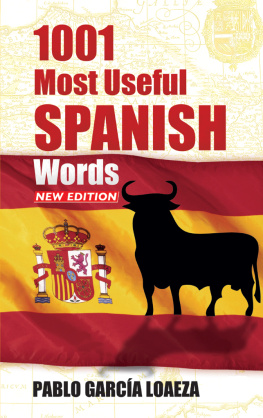
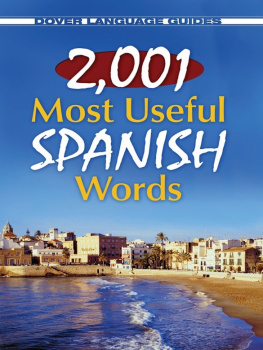
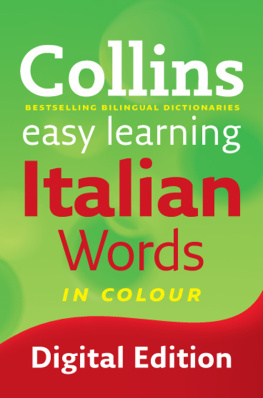
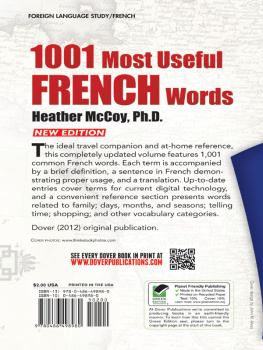
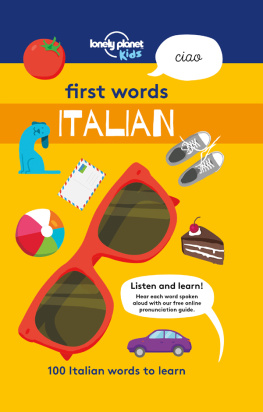
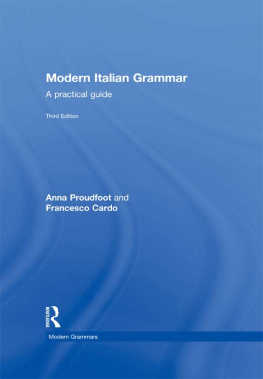
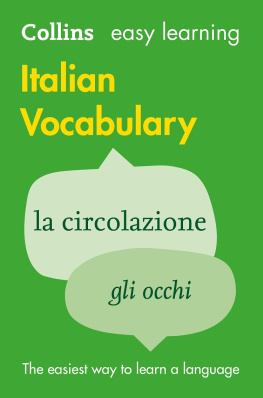
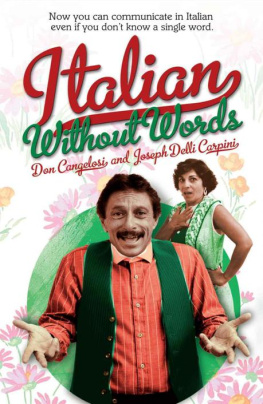

 Giovanni Maria DettoriDOVER PUBLICATIONS, INC.Mineola, New YorkCopyright Copyright 2011 by Giovanni Maria Dettori All rights reserved. Bibliographical Note2,001 Most Useful Italian Words is a new work, first published by Dover Publications, Inc., in 2011. Library of Congress Cataloging-in-Publication Data Dettori, Giovanni Maria. 2,001 most useful Italian words / Giovanni Maria Dettori. p. (Dover language guides) English and Italian. eISBN-13: 978-0-486-17394-8 1. eISBN-13: 978-0-486-17394-8 1.
Giovanni Maria DettoriDOVER PUBLICATIONS, INC.Mineola, New YorkCopyright Copyright 2011 by Giovanni Maria Dettori All rights reserved. Bibliographical Note2,001 Most Useful Italian Words is a new work, first published by Dover Publications, Inc., in 2011. Library of Congress Cataloging-in-Publication Data Dettori, Giovanni Maria. 2,001 most useful Italian words / Giovanni Maria Dettori. p. (Dover language guides) English and Italian. eISBN-13: 978-0-486-17394-8 1. eISBN-13: 978-0-486-17394-8 1.